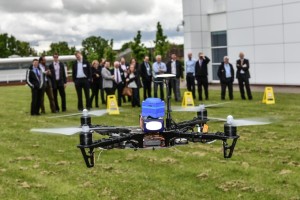
The ability to access the PRS via the cloud overcomes a major problem for some potential PRS users due to the security protocols that are required when managing the cryptographic keys needed to access the signals. Read more…


The ability to access the PRS via the cloud overcomes a major problem for some potential PRS users due to the security protocols that are required when managing the cryptographic keys needed to access the signals. Read more…
Speaking at a session completely dedicated to autonomous vehicles, GSA Head of Market Development Gian-Gherardo Calini said that accurate and reliable positioning information is a clear enabler for autonomous vehicles. “With its dual frequencies, better reliability and ability to cope with multi-path characteristics in urban environments, Galileo could be a big differentiator in this potentially huge market,” he said.
However, implementing the technologies is challenging. For example, according to Centro Ricerche Fiat Programme Manager Luisa Andreone, the higher you moved up the automation levels in vehicles, the more accurate the positioning requirements are. Other key elements are signal availability, integrity, affordability and regulations. Read more…
One area where Galileo is likely to have maximum impact is the Public Regulated Service (PRS). The PRS will provide a robust and encrypted positioning and timing capability restricted to governmental authorised users. Speaking at the event, DG Growth Head of Unit, Galileo Directorate Philippe Jean described the service and the access control mechanisms that will minimise interfering threats and so offer continuity of service in times of crisis. “The PRS signal structure has better resilience to jamming and interference,” he said. Jean also said that the Member States and the Commission are considering how to allow secure access to PRS by third-party countries.
“Active contributions from all the different stakeholders involved in PRS is required to ensure delivery of service to authorised users,” added GSA PRS Officer Marco Detratti. “Competent PRS authorities (CPAs) are being established at the national level, but to build trust, the system and equipment must deliver a truly robust service that grants unlimited and uninterrupted access worldwide.” Read more…
The timing services supplied by GNSS are an increasingly important, but often unrecognised, part of today’s modern infrastructure. This is because the vital role of space-based timing is only exposed when it fails. To shed some light on just how important these services are, this year the Munich Satellite Summit’s legal session focused on the timing aspects of GNSS.
“Many sophisticated timing applications rely on GNSS signals,” said BHO legal partner Dr Oliver Heinrich. “However, they tend to be taken for granted and are only noticed when things go wrong, such as what happened on 26 January when a software upload to GPS satellites induced a 13 millisecond misalignment – a small difference that had a big global impact. Read more…
The EU’s Galileo satellite navigation system now has eight satellites in orbit following the launch of the latest pair. Galileo 7 & 8 lifted off at 21:46 GMT (22:46 CET) on 27 March from Europe’s Spaceport in French Guiana on top of a Soyuz rocket. All the Soyuz stages performed as planned, with the Fregat upper stage releasing the satellites into their target orbit close to 23 500 km altitude, around 3 hours 48 minutes after liftoff.
Following initial checks, run jointly by ESA and France’s CNES space agency from the CNES Toulouse centre, the two satellites will be handed over to the Galileo Control Centre in Oberpfaffenhofen, Germany and the Galileo in-orbit testing facility in Redu, Belgium for testing before they are commissioned for operational service. This is expected in mid-year. Read more…
After placing two more Galileo satellites into orbit and receiving signals proving that they are positioned as expected, Elzbieta Bienkowska, European Commissioner for Internal Market, Industry, Entrepreneurship and SMEs, commented: “The successful launch of two Galileo satellites takes us one step closer to a global European satellite navigation system. Today we demonstrated again that Europe has state-of-the-art know-how, cutting edge technology, and the vision and determination to accomplish great things. Whether you’re hoping to benefit from the next generation of in-car Satellite Navigation – or the reassurance of knowing the coastguard can deploy Search and Rescue – Galileo will soon provide you with great opportunities.” Read more…